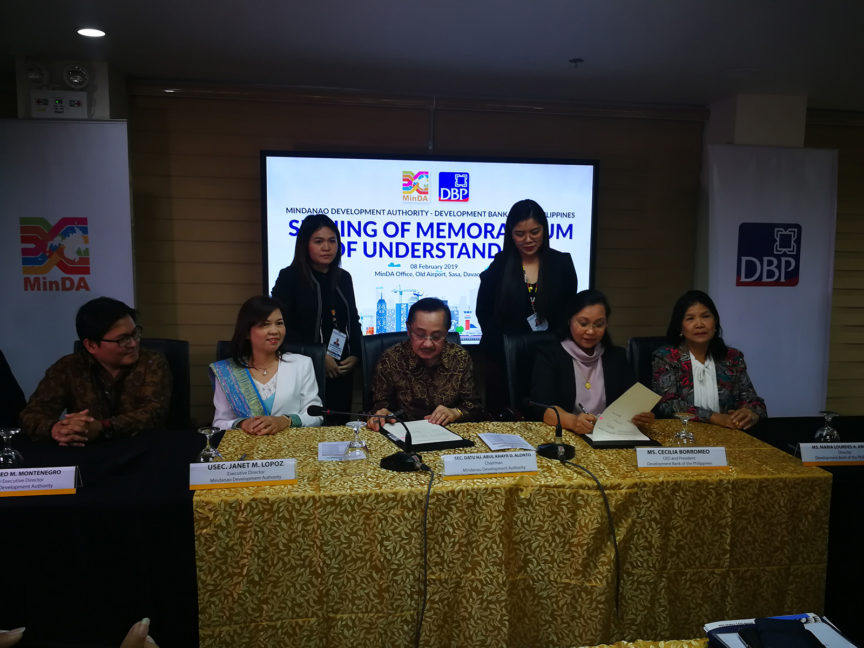 MinDA chair Abul Khayr Alonto and DBP president Cecilia Borromeo during the signing of the MOU. MindaNews photo by ANTONIO L. COLINA IV
MinDA chair Abul Khayr Alonto and DBP president Cecilia Borromeo during the signing of the MOU. MindaNews photo by ANTONIO L. COLINA IV
DAVAO CITY (MindaNews/9 February) – The Mindanao Development Authority (MinDA) forged Friday a memorandum of understanding with Development Bank of the Philippines (DBP) formalizing their partnership to expedite the flagship projects and programs for Mindanao under the 2017 to 2022 Philippine Development Plan.
The MOU was signed by MinDA chairman Abul Khayr Alonto and DBP President Cecilia Borromeo.
The DBP will serve as a “financial advisor” of MinDA to assist “in reviewing its proposals and plans, particularly in relation to commerciality and bankability of projects, and in developing a high-level strategy towards the structuring of identified projects primarily through private sector development.”
Alonto admitted they cannot miss the opportunity for Mindanao to move forward and grow as “time is ticking too fast” to fulfill the “promise of Mindanao” within the six-year term of the first Mindanawon President, Rodrigo R. Duterte.
“With DBP as our financial advisor, we are confident to have an ally when it comes to urgent funding support for projects that will improve Mindanao and create jobs particularly in the Bangsamoro areas to attain lasting peace through inclusive economic development,” he said.
He expressed confidence they can efficiently deliver results for the remaining half of Duterte’s six-year term with DBP, the government’s “infrastructure bank,” as their partner.
Borromeo added that aside from providing MinDA with technical assistance, the state-owned bank can also finance a portion of the projects that would be pursued by MinDA and other private sector partners.
“The primary role of Development Bank of the Philippines is an advisor to the Mindanao Development Authority. However, if there are participants in the projects that will be pursued by the MinDA that would need financing, then DBP the bank can finance a portion of those projects,” she said.
The executive added that the top priority sectors of the DBP include infrastructure projects, transportation, social services including health and education, energy, water, and micro, small, and medium enterprises.
She added they will also support any project that “would protect the environment and make the communities more adaptive to the ravages of climate change like typhoons would be among our priority programs.”
MinDA executive director Romeo Montenegro said details of what projects they will push through under the MinDA-DBP partnership will still have to be threshed out in the technical discussions.
But he added it will include infrastructure projects i “that are otherwise in need of external (financing) other than those being funded by ODAs (official development assistance) or by GAA (General Appropriations Act).”
He said MinDA eyes to get support for its 12 catalytic programs of MinDA namely, the 2,135-km Trans-Mindanao High Speed Railway System (TMHSRS) worth P753.5 billion; Marawi rehabilitation for livelihood and business development, land resource management, and social services that would need P 16 billion; P42 billion for the establishment of Agro-Economic Zones in Zamboanga del Norte, Zamboanga del Sur, Zamboanga Sibugay, Agusan del Sur, Maguindanao, Lanao del Sur, and Basilan; and P15 billion for the Tawi-Tawi Integrated Development Project/Ecozone;
The P25 billion for Picong FreePort and Ecozone in Picong, Lanao del Sur; P39.2 billion for the Mindanao River Basin Integrated Flood Control Projects; P300 million for the proposed Mindanao Executive Leadership Academy in Maramag, Bukidnon; P75 billion for the MinDC Interregional Connectivity Projects comprising roads and bridges;
P100 million for Tourism Assistance Center in 20 strategic areas in Mindanao; P9.8 billion for New Zamboanga Airport in Mercedes, Zamboanga City; and P100 million for Polloc Freeport and Ecozone in Polloc, Maguindanao; and P9.8 billion for General Santos Aerotropolis that is still recommended for a feasibility study.
He added they plan to help out projects of the private sector, including renewable energy and agribusiness, particularly agro-processing. (Antonio L. Colina IV/MindaNews)
